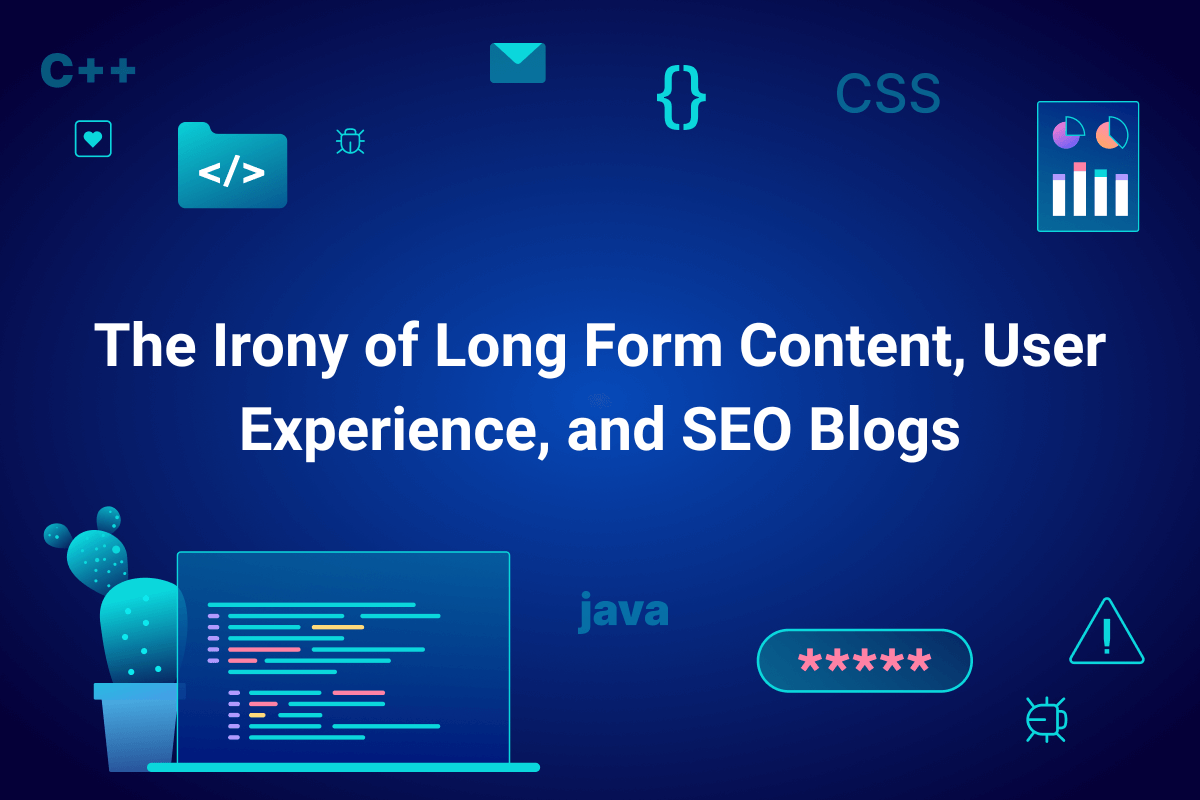Since your first girlfriend told you not to buy her a birthday present, and you actually listened, there hasn’t been an announcement this confusing. why confusing?! Because no one really knows the answer to the question:
What do readers actually want?
First, does the reader even matter? It’s Google’s world and we are all but players in it. Don’t know what readers want?! That’s ok. Google knows (or do they?).
For the past few years, Google has been taking large gulps straight from the user experience cool-aid, and telling us that we must all put the user first and create content that users will love.
But, what does that actually mean? Frankly, I have no f$%king clue but I’m willing to put my vote in the hat with all the other more and less educated guesses.
These educated guesses tend to look like an eager to please child trying to please an absent parent: “Look at my title tags, Daddy”. “I got a 90% on my performance test today, Daddy”. “Why won’t you look at me?!”
Is it any wonder we grow up to be confused SEO consultants and experts.
For example, SEO gurus like Brian Dean of Backlinko and Rand Fishkin of MOZ will tell you that, to Google, user experience means social shares and time on page. So if you increase these metrics then you’ll improve user experience and improve your rankings, drive more traffic, and be an all around better person.
Could it really be that simple?
The real question is: Do you really have any other choice than to take SEO gurus at their word?
- They’ve crunched the numbers and you haven’t.
- They’ve crunched so many numbers it has to be true.
- They’ve been doing this forever.
- No one else is willing to defy them…at least not for the first few years.
Unless you’ve built your own powerful SEO tool that has tons of data, it will take you forever to disprove these SEO icons. Not too many bloggers have the resources to do it or the interest to take them on.
So, we have to take them at their word that user experience is this very very important thing and that because longer content means more social shares, longer time on page, and Google loves that, then we must write longer content.
How the SEO guru system works
The gurus pump out a lot of content about how to write content, and not nearly as much about how to market it. Content without content marketing is like a castle without a wall and moat. It can’t defend itself against the competition. So why is there so much more content about content?
Because content is king but content marketing is less than noble.
If we’re students of history we know that when a king is throned prematurely he usually has to rely on his advisors to tell him what to do and how to rule. Coronating content has meant a proliferation of content creators. They possess a powerful tool at their disposal but lack the experience and knowledge of how to use it. At this point, step in the gurus, whose sinister plan is finally coming into fruition.
Believing that content is king, content creators are pumping out content like never before. The gurus tell them it’s not good enough quality, which is why it won’t rank. However, they know this is an oversimplification. It’s only the first step in their sales funnel.
They can only afford to give away just that much knowledge for free that will make the reader or viewer feel or see that they are making progress. But they know that if they give away the cow for free no one will pay for its milk.
Naturally, these gurus want to preserve the current atmosphere so they keep pumping the same old rhetoric about how great content is and how important user experience is for Google’s algorithms. When, in fact, nothing much has changed as far as Google is concerned. Keyword stuffing doesn’t work anymore? It sure does, you just need to be sophisticated about it. PBNs will get you a penalty? Not if you’re careful. Pagerank doesn’t exist? Call it what you like, there is a clear ranking for pages.
So if you think that if you write it, they will come, your strategy is deader than SEO. Just kidding. SEO is alive and kicking. And that’s the point. You have to promote your content. You must do off-page SEO and build links. You need to target your content at bots just as much as you do to actual readers. What you must find is a balance between being overly optimized for search engines and just waiting for search engines to find you. Because waiting for SEs to find you is like waiting for a boy to ask you to dance at a 5th grade party – You’ll be the last one left sitting on the side.
Develop simple strategies that can be scaled up. It’s great to find an ROI positive tactic for traffic generation but if you find one that scales, you’re really on to something.
What do I mean? Well, scalable tactics have one thing in common, they’re simple to implement. And that’s what SEOs are looking for. A simple to implement tactic that will help them understand what the hell Google is on about. So blogs like Backlinko and MOZ try to deliver actionable insights like “If you want to improve user experience and get on Google’s good graces you need to improve time on page, pages per session, and social shares”. In other words, engagement metrics. That’s a simple solution that can be easily scaled and turned into a formula.

The Founder & Chief Getting Sh%T Done Officer of mvpGrow. After about 8 years as a hired hand some of the largest (and smallest) B2B SaaS companies worldwide I decided to hang up my employee slippers and lace up my growth agency cleats. But just because I’m an agency doesn’t mean we can’t chat (no charge). Please email me on any topic and I will gladly reply: eyal@mvpgrow.com

